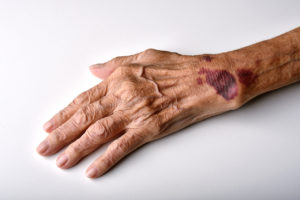 We’ve seen the idyllic pictures of nursing homes on television and the covers of glossy publications. Smiling faces, beautiful meals, tree-lined gardens, and a whole host of activities to keep your loved ones active and happy.
We’ve seen the idyllic pictures of nursing homes on television and the covers of glossy publications. Smiling faces, beautiful meals, tree-lined gardens, and a whole host of activities to keep your loved ones active and happy.
Unfortunately, the reality isn’t always as glamorous as the sales pitch. Nursing homes try to make a difficult decision seem easy. You know you don’t have the medical means of keeping your loved one at home, so you put your trust in the facility. What happens when that trust is broken? In one study, the World Health Organization found that two in three staff members admitted to committing some form of abuse while working in a nursing home, and they believe the rate of abuse may be much higher than what’s currently being reported.
At Minner Vines Injury Lawyers, PLLC we know that your family member deserves better. Elderly residents of nursing homes are finding themselves on the receiving end of abuse in the form of physical restraints. Whether used as a form of punishment or as a result of poor staffing practices, residents are being tied down or otherwise rendered immobile, often without food, water, or help.
Don’t let negligent nursing homes get away with this barbaric practice. Contact or call Minner Vines Injury Lawyers, PLLC at (859) 550-2900 for a consultation and find out how we can help you.
What Is Physical Restraint?

The definition of a physical restraint may seem pretty straightforward. It is considered any type of mechanical or physical device or even material that is attached to a person’s body as a means of holding them in place. The purpose of a physical restraint is to keep a person or a body part immobile. Physical restraints are attached in such a way as to make them difficult or impossible for a resident to remove on their own.
How Are Restraints Used Nursing Homes?
There are legitimate medical reasons for the use of restraints in a nursing home setting. In special circumstances, nursing homes are allowed to use physical restraints to keep an elderly resident from hurting themselves or others. In fact, federal law dictates that restraints may be used in order to treat a resident’s medical symptoms.
However, they are not allowed to be used without the consent of the resident or resident’s attorney or legal representative. Federal law also states that if restraints are needed for a medical concern, the resident must be released from the restraints at least every two hours.
While the use of restraints is supposed to be for a limited number of legitimate medical and safety concerns, that is not always the case at some facilities. In some situations, the lack of proper staffing is to blame for caregivers’ use of restraints. Feeling overwhelmed by the volume of patients they must attend to and unable to provide proper care to everyone, strained employees resort to using restraints to keep patients immobile and “under control” so that they are “out of the way.”
In an effort to combat chronic understaffing, a nursing home may resort to improper hiring procedures – for example, hiring people without conducting proper background screenings. These people may have criminal backgrounds, dismissals from other medical positions, or insufficient education for the role.
In addition to poor hiring practices, a nursing home may also push staff members into a caregiving role without proper training, guidance, or supervision. Any or all of these factors can contribute to the use of improper physical abuse within a nursing home.
What Can be Used as a Restraint?
There are medical-grade restraints, and there are makeshift restraints. Either one can be used to keep an elderly nursing home resident immobile. Some examples of physical restraints include:
- Bedrails
- Hand mitts
- Soft ties
- Belts
- Vests
- Specialized chairs
- Lap belts
Physical restraints may also be crafted from materials found in a residents’ room, such as a belt, nylon stocking, or neckties. Caregivers may even use strips of bandages, towels, or bedsheets as a means of keeping a resident from moving.
What Are the Risks Associated With Using Restraints in Kentucky?
Using physical restraints on the elderly can lead to severe medical consequences. Imagine if an elderly person was improperly restrained to their bed. Trying to get up or move could result in a fall that strangles or chokes them on their restraint. Research published in the National Center for Biotechnology Information outlines many of the physical complications that can arise from the use of restraints:
- Bruises
- Ulcers
- Bedsores
- Difficulty breathing or respiratory complications
- Incontinence
- Constipation
- Malnutrition or undernutrition
- Dehydration
- Loss of balance
- Impaired muscle strength and atrophy
- Wrongful death
In addition to the serious medical threats that restraints can pose, there are also the unseen scars that can impact residents, as well. The use of restraints can be humiliating and lead to negative emotional and psychological effects. A resident may begin to suffer from anxiety and depression. Being unable to move or care for yourself may foster resentment by taking away a person’s dignity and ability to perform simple daily functions.
If you notice a change in your loved one’s appearance or mental state, ask questions. Looks for marks or signs of restraints cutting into the skin or unusual bruising. A loved one may be reluctant to come right out and say they are being abused, as they may fear retaliation from a caregiver or fear judgment from family and friends.
At this time, you are your loved one’s best and most important advocate. If you have nagging suspicions, contact us today. We can investigate your concerns and hold negligent nursing homes accountable for their deplorable actions.
How Can a Kentucky Nursing Home Abuse Lawyer Help Me?
 At Minner Vines Injury Lawyers, PLLC, we know that you are going through a very dark time. The thought of a loved one suffering at the hands of a negligent nursing home is stomach-turning. There is hope, however. The experienced nursing home abuse attorneys at Minner Vines Injury Lawyers, PLLC can offer you a compassionate shoulder to lean on, while aggressively seeking justice for your family members. Negligent nursing homes cannot be allowed to get away with abusing the most vulnerable people in our community.
At Minner Vines Injury Lawyers, PLLC, we know that you are going through a very dark time. The thought of a loved one suffering at the hands of a negligent nursing home is stomach-turning. There is hope, however. The experienced nursing home abuse attorneys at Minner Vines Injury Lawyers, PLLC can offer you a compassionate shoulder to lean on, while aggressively seeking justice for your family members. Negligent nursing homes cannot be allowed to get away with abusing the most vulnerable people in our community.
If you suspect that your loved one is being improperly restrained or otherwise abused in a nursing home facility, call us at (859) 550-2900. We can set up a consultation and get you and your family the help you deserve.